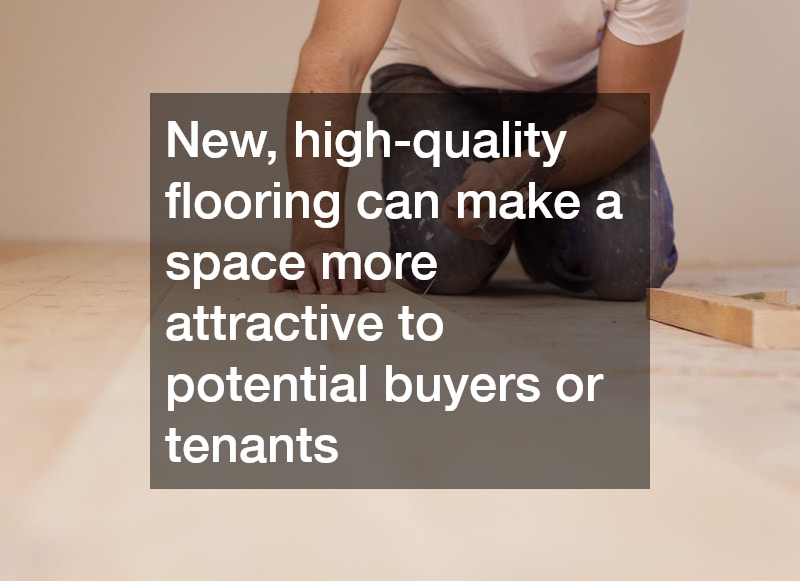Flooring is one of the most overlooked elements in any commercial space, yet it plays a crucial role in both the aesthetic and functional aspects of a business. While it might seem like a costly and unnecessary task to replace flooring frequently, doing so can actually have numerous benefits for a business. Whether you’re operating a retail store, office, or restaurant, the condition of your flooring can impact everything from customer perception to employee productivity. In this article, we’ll explore why your business needs to replace its flooring frequently and how this investment can enhance your space in the long run.
1. Maintain a Professional Appearance
First impressions matter, and the condition of your flooring is one of the first things customers, clients, or visitors notice when entering your space. Worn-out, scratched, or stained flooring can create a negative impression, even if the rest of your establishment looks immaculate.
For businesses in high-traffic areas, the flooring can show signs of wear and tear more quickly, which may make it appear unprofessional or uncaring.
Regularly replacing your flooring ensures that your space always looks fresh and inviting. It also provides an opportunity to upgrade to a more modern and appealing flooring style, which can have a significant impact on the overall atmosphere of your business. A well-maintained floor conveys a message of quality, attention to detail, and commitment to providing a positive experience for your customers.
2. Improve Employee Productivity and Safety
In addition to its visual impact, flooring plays a key role in the safety and comfort of your employees. Damaged flooring, such as loose tiles, warped boards, or cracked surfaces, can pose tripping hazards and increase the risk of workplace injuries. These accidents can lead to costly workers’ compensation claims, lost productivity, and a less-than-ideal work environment.
Replacing worn-out flooring with newer, safer materials can help prevent these risks. For example, tile installation, which is both durable and easy to clean, can provide a slip-resistant surface that’s ideal for busy workplaces, especially in kitchens, bathrooms, or industrial settings. In areas where spills or moisture are common, choosing the right type of flooring can reduce the likelihood of accidents and keep your employees safe.
Comfort is also a major consideration. Hard, cold floors like tile or concrete can be uncomfortable to stand or walk on for long periods. Replacing flooring with options such as cushioned vinyl or rubber tiles can improve ergonomics and reduce fatigue for employees who spend extended hours on their feet.
3. Increase Longevity and Cost Savings
While it may seem counterintuitive to replace your flooring frequently, doing so can actually save you money in the long term. Flooring that is worn out, damaged, or outdated can lead to higher repair and maintenance costs. For instance, if a tile starts to crack or loosen, it may require costly repairs, and if the damage goes unnoticed, it could eventually lead to further deterioration that impacts the structural integrity of your floor.
By replacing your flooring proactively, you can avoid these larger, more expensive issues. Regular flooring replacement ensures that your space remains functional and minimizes the risk of costly repairs or even premature replacements down the road. Additionally, installing high-quality materials from the start will extend the lifespan of your flooring, making it a worthwhile investment for your business.
4. Boost Hygiene and Cleanliness
In industries such as healthcare, food service, or retail, hygiene and cleanliness are of the utmost importance. Dirty, stained, or damaged flooring can create a breeding ground for bacteria and other contaminants. Even with regular cleaning, old flooring may retain dirt, grime, and moisture in its surface, creating health and sanitation risks.
Tile flooring, in particular, is an excellent choice for businesses that prioritize cleanliness. It’s non-porous, easy to disinfect, and highly resistant to stains and odors. Frequent tile installation or replacement helps ensure that your floors remain hygienic, making it easier to maintain a clean, sanitary environment for both employees and customers. This is particularly important in high-traffic areas, where dirt and bacteria can accumulate quickly.
5. Adapt to Changing Business Needs
As your business grows or changes, so too may your flooring needs. For example, if you’re expanding your space, renovating your office, or altering the layout of your retail store, you may need to replace or adjust your flooring to match the new design. A frequent flooring replacement schedule allows you to stay flexible and adapt to the changing needs of your business, ensuring that your space always supports your operational requirements.
Similarly, businesses that deal with evolving trends may want to replace their flooring to keep up with changing aesthetic preferences. Flooring that looks outdated can make your business feel stuck in the past, while new materials and styles can help convey a modern, fresh image that aligns with your brand.
6. Increase Property Value
If your business is located in a leased or owned property, regularly replacing the flooring can also increase the overall value of the property. New, high-quality flooring can make a space more attractive to potential buyers or tenants, which is particularly important if you’re planning to sell or lease the property in the future. Even if you don’t plan to move anytime soon, maintaining a well-kept, up-to-date space can enhance your property’s overall marketability.
.






